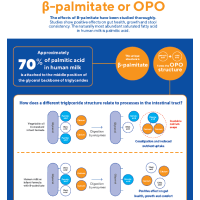
Kabrita contains β-palmitate to support comfort to infants
In human milk, about 50% of the energy is supplied to infants as fat. However, fat is not only necessary as a source of energy, but has many more functions, such as developing the infant’s brain and vision, supporting the structure of the cells, maintaining the body temperature, and making hormones.1 The fat composition of human milk varies highly throughout the day and depends on the period of lactation. The absorption rate of fat is influenced by the fat composition and structure. Human milk contains several fatty acids of which palmitic acid is one of the major ones.2
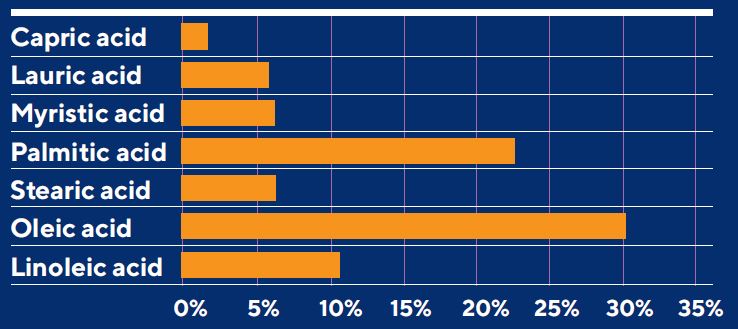
Palmitic acid and calcium soaps
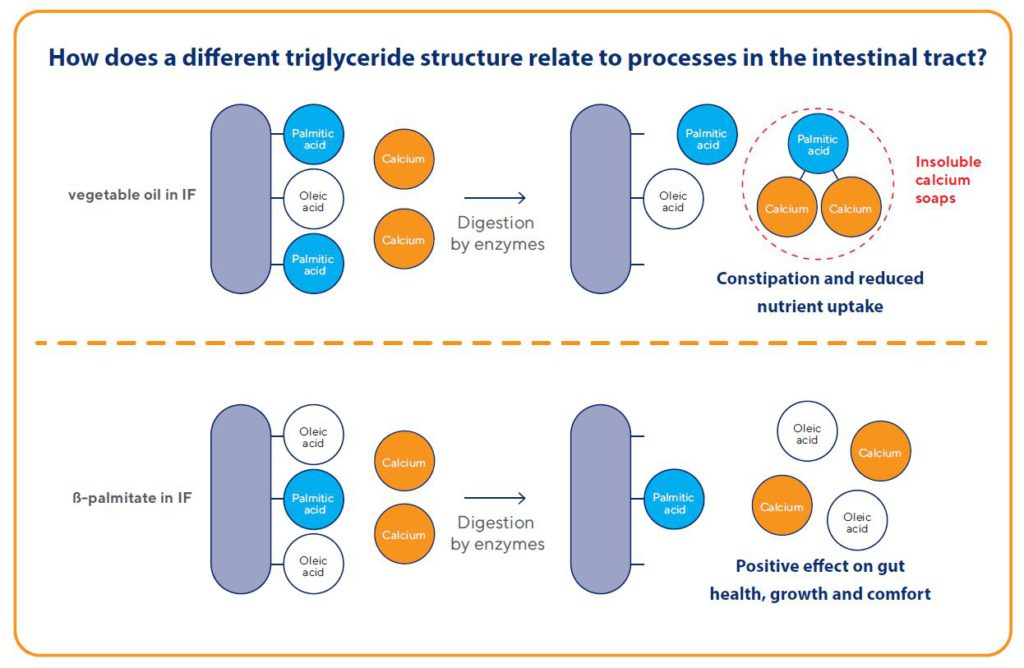
When palmitic acid is bound in the middle or beta position of the glycerol backbone, it is called β-palmitic acid. About 60% of the palmitic acid in human milk bonds to this beta-position and is β-palmitic acid. In the gastrointestinal tract, β-palmitic acid is not hydrolyzed into free palmitic acid and therefore does not form insoluble calcium soaps, meaning that both calcium and fatty acids can be better absorbed. 3,4 This better calcium and fatty acid absorption can reduce infant discomfort. If the palmitic acid is not bound in the beta position, it can be hydrolyzed into free palmitic acid which can form insoluble calcium soaps, resulting in hard stools. β-palmitic acid can prevent hard stools and even constipation.3
More information about β-palmitic acid can be found in the infographic below.

Influence of β-palmitic acid on gut microbiota development
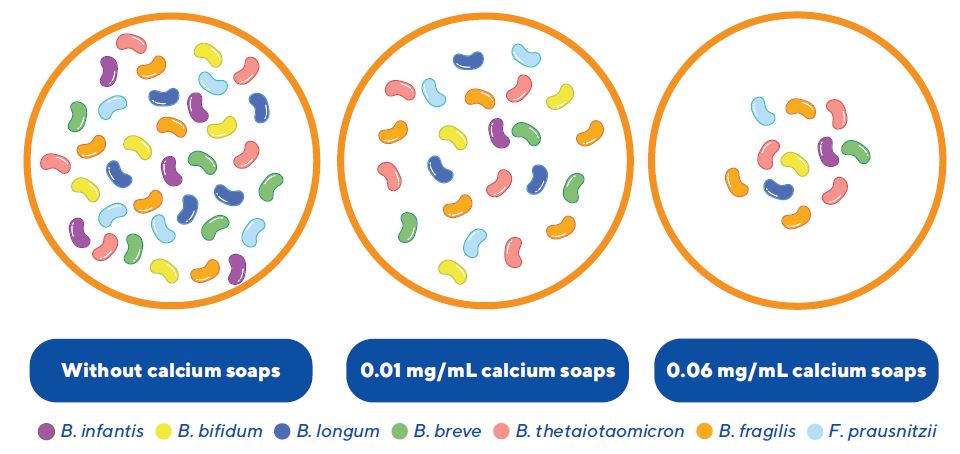
Moreover, β-palmitic acid has been reported to have a positive influence on the development of the gut microbiota, because calcium soaps limit the growth of important beneficial bacteria in early life stages.4 In collaboration with University Medical Center Groningen, Ausnutria investigated the negative effects of calcium soaps on the gut microbiota.5
All the details about this study can be found in the paper below.
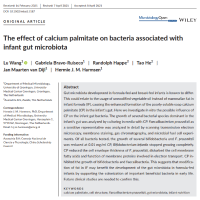
Paper: calcium soaps and microbiota (Wang et al. 2021)
In this study, Faecalibacterium prausnitzii and other dominant bacteria in the infant gut were cultured in media with different concentrations of calcium soaps. Calcium soaps inhibited the growth of beneficial bacteria such as F. prausnitzii and several bifidobacteria, even at a very low concentration (0.01 mg/ml calcium soaps).5 F. prausnitzii colonizes the gut around the age of six months and has anti-inflammatory properties.6,7Reduced growth of F. prausnitzii and other beneficial bacteria creates the risk of a disbalanced gut microbiota and can thus negatively impact the health of infants. This research showed that Kabrita formula with high levels of β-palmitate may be beneficial for a well-balanced gut microbiota because of the reduced formation of calcium soaps.5
Check the infographic and animation below for a quick overview of this study.
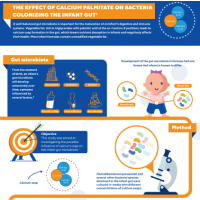
Infographic: calcium soaps and microbiota
High levels of β-palmitate in Infant Formula
A recent double-blind study involving 300 healthy term infants showed that a high content of β-palmitic acid in infant formula resulted in higher faecal bifidobacteria concentrations and improved stool consistency, similar to human milk-fed infants.8 Two randomized double-blind studies showed that an infant formula with β-palmitic acid reduced crying time and improved infant sleep. These studies concluded that β-palmitic acid improved the well-being of formula-fed infants and consequently the quality of life of their parents.9-11
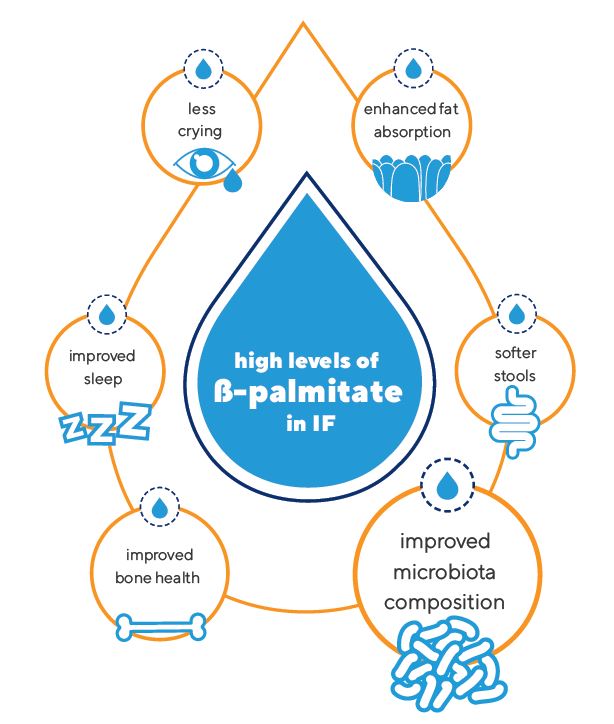
Conclusion
Kabrita formula contains a fat blend rich in β-palmitic acid, resembling the fatty acid profile of human milk more closely. The β-palmitic acid in Kabrita infant formula is proven to offer comfort to infants, with benefits such as reduced crying time, prevention of hard stools and a well-balanced gut microbiota.
References
- 1. Karaivazoglou, K., et al., Neonate gut colonization: The rise of a social brain. Neurogastroenterol Motil, 2019: p. e13767.12
- 2. Szabo, E., et al., Fatty acid profile comparisons in human milk sampled from the same mothers at the sixth week and the sixth month of lactation. J Pediatr Gastroenterol Nutr, 2010. 50(3): p. 316-20.
- 3. Bronsky, J., et al., Palm Oil and Beta-palmitate in Infant Formula: A Position Paper by the European Society for Paediatric Gastroenterology, Hepatology, and Nutrition (ESPGHAN) Committee on Nutrition. J Pediatr Gastroenterol Nutr, 2019. 68(5): p. 742-760.
- 4. Havlicekova, Z., et al., Beta-palmitate – a natural component of human milk in supplemental milk formulas. Nutr J, 2016. 15: p. 28.
- 5. Wang, L., et al., The effect of calcium palmitate on bacteria associated with infant gut microbiota. Microbiologyopen, 2021. 10(3): p. e1187.
- 6. Sokol, H., et al., Faecalibacterium prausnitzii is an anti-inflammatory commensal bacterium identified by gut microbiota analysis of Crohn disease patients. Proc Natl Acad Sci U S A, 2008. 105(43): p. 16731-6.
- 7. de Goffau, M.C., et al., Fecal microbiota composition differs between children with β-cell autoimmunity and those without. Diabetes, 2013. 62(4): p. 1238-44.
- 8. Yao, M., et al., Effects of term infant formulas containing high sn-2 palmitate with and without oligofructose on stool composition, stool characteristics, and bifidogenicity. J Pediatr Gastroenterol Nutr, 2014. 59(4): p. 440-8.93
- 9. Litmanovitz, I., et al., Reduced crying in term infants fed high beta-palmitate formula: a double-blind randomized clinical trial. BMC Pediatr, 2014. 14: p. 152.
- 10. Bar-Yoseph, F., et al., SN2-Palmitate Improves Crying and Sleep in Infants Fed Formula with Prebiotics: A Double-Blind Randomized Clinical Trial. Clinics Mother Child Health, 2017. 14:2.
- 11. Miles, E.A. and P.C. Calder, The influence of the position of palmitate in infant formula triacylglycerols on health outcomes. Nutr Res, 2017. 44: p. 1-8.



